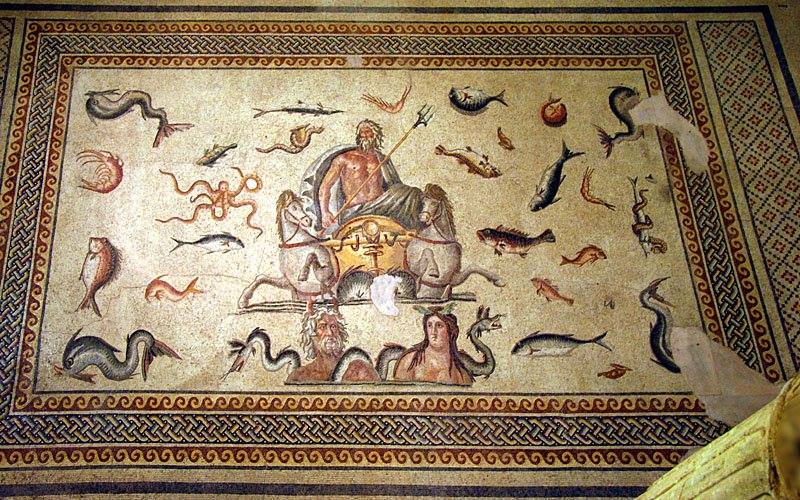Two words that are repeatedly used in the tale of Niobe are felix - happy, fortunate, blissful - and orba - destitute, lacking, spoiled, robbed.
Niobe says:
She scorns Latona:
felicity

orphan
One could say the tale of Niobe as Ovid tells it is the story of Niobe changing from mater felix to enslaved orphan:
Childless, she sat among the [lifeless] bodies of her sons, her daughters, and her husband:
Early in the tale (152: multa dabant animos), we learn that it was Niobe's children that made her most animosa - which yields both "pride" and "liveliness, spiritedness." (We recall that Arachne also had a guttura animosa).
Here Ovid subtly underscores what is happening to the mother by his use of exanimes for the children ("lifeless" -- curiously omitted in Kline's version): a kind of self-orphaning, leading, unless this is too fanciful, to a robotic condition. One must take care before saying something is too fanciful for a poet.
Sum felix: quis enim neget hoc? felixque manebo:I am happy (fortunate): who could deny this? And I will remain fortunate.
She scorns Latona:
Fingite demi
huic aliquid populo natorum posse meorum,
non tamen ad numerum redigar spoliata duorum,
200 Latonae turbam: qua quantum distat ab orba?
Imagine that some of this host of children could be taken from me, I would still not, be stripped -- reduced to the two of Latona’s "crowd."
In that state, how far is she from childlessness?Kline's translation of orba as "childlessness" is reasonable here, but when one looks at the etymological roots of the words "felix" and "orba," an interesting relationship emerges:
felicity
late 14c., from O.Fr. felicite (14c.) "happiness," from L. felicitatem (nom. felicitas) "happiness, fertility," from felix (gen. felicis) "happy, fortunate, fruitful, fertile," from L. base *fe-, equivalent of PIE *dhe(i)- "to suck, suckle, produce, yield" (see fecund)fecund
early 15c., from M.Fr. fecond, from L. fecundus "fruitful, fertile, productive," from *fe-kwondo-, suffixed form of L. base *fe-, corresponding to PIE *dhe(i)- "to suck, suckle," also "produce, yield" (cf. Skt. dhayati "sucks," dhayah "nourishing;" Gk. thele"mother's breast, nipple," thelys "female, fruitful;" O.C.S. dojiti "to suckle," dojilica "nurse," deti "child;" Lith. dele "leech;" O.Prus.dadan "milk;" Goth. daddjan "to suckle;" O.Swed. dia "suckle;" O.H.G. tila "female breast;" O.Ir. denaim "I suck," dinu "lamb"). Also from the same Latin base come felare "to suck;" femina "woman" (*fe-mna-, lit. "she who suckles"); felix "happy, auspicious, fruitful;" fetus "offspring, pregnancy;" fenum "hay" (probably lit. "produce"); and probably filia/filius "daughter/son," assimilated from *felios, originally "a suckling."If the root of felicity is to give/receive nourishment of the maternal breast (and the words for "woman" and "child" derive from the same root), the root of "orba" is precisely the privation of that breast:
orphan

c.1300, from L.L. orphanus "parentless child" (cf. O.Fr. orfeno, It. orfano), from Gk. orphanos "orphaned," lit. "deprived," fromorphos "bereft," from PIE *orbho- "bereft of father," also "deprived of free status," from base *orbh- "to change allegiance, to pass from one status to another" (cf. Hittite harb- "change allegiance," L. orbus "bereft," Skt. arbhah "weak, child," Arm. orb "orphan," O.Ir. orbe "heir," O.C.S. rabu "slave," rabota "servitude" (cf. robot), Goth. arbja, Ger. erbe, O.E. ierfa "heir," O.H.G. arabeit, Ger.Arbeit "work," O.Fris. arbed, O.E. earfoð "hardship, suffering, trouble"). The verb is attested from 1814. Related: Orphaned;orphaning.The roots divide around the terms of breast, nourishment, freedom, fertility, plenitude (and, interestingly, "change,") vs. privation, orphanhood, enslavement and work. One might note that in Latin, liberi, the plural of liber, i.e., free, meant "children."
One could say the tale of Niobe as Ovid tells it is the story of Niobe changing from mater felix to enslaved orphan:
Orba resedit
exanimes inter natos natasque virumque (301-2)
Childless, she sat among the [lifeless] bodies of her sons, her daughters, and her husband:
Early in the tale (152: multa dabant animos), we learn that it was Niobe's children that made her most animosa - which yields both "pride" and "liveliness, spiritedness." (We recall that Arachne also had a guttura animosa).
Here Ovid subtly underscores what is happening to the mother by his use of exanimes for the children ("lifeless" -- curiously omitted in Kline's version): a kind of self-orphaning, leading, unless this is too fanciful, to a robotic condition. One must take care before saying something is too fanciful for a poet.

No comments:
Post a Comment